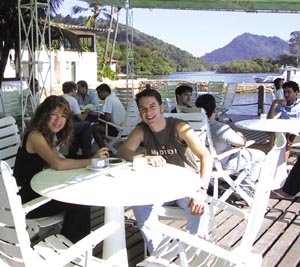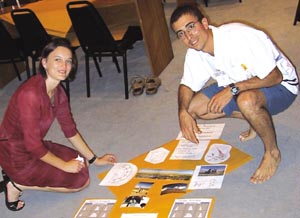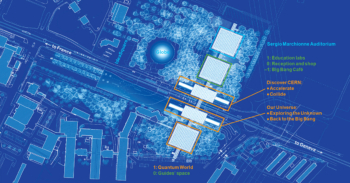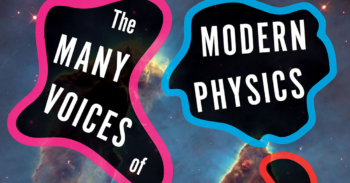
The first school of high-energy physics organized jointly by CERN and CLAF (Centro latinoamericano de física), Rio de Janeiro was held in Itacuruçá, Brazil on 6-19 May and it hopefully marked the opening of a close collaboration between CERN and physicists in Latin America.
This new series of biennial schools is modelled on the school of physics organized by CERN and the Joint Institute for Nuclear Research in Dubna near Moscow, which was, and continues to be, instrumental in fostering relations between CERN and former socialist countries.
Some 71 students attended the inaugural CERN-CLAF school, 56 of them coming from eight Latin-American countries (17 from Mexico, 16 from Brazil, 11 from Argentina and 12 from other countries), 13 from Europe and two from the US.
The Latin-American students were centrally funded for all of their travel, board and lodging, while other students were funded by their home institutes. Financial support came from CERN, Spain, France, Portugal and Italy, in addition to Brazil, Mexico and CLAF.
The students were accommodated in twin and triple rooms with students from different countries and regions sharing the same room. This was an important factor contributing to the success of the school.
The 11 lecturers came from Europe, Latin America and the US. The lectures, which were in English, were complemented by daily discussion sessions led by seven physicists from Latin America. The students presented their work in an enthusiastic poster session.
A survey carried out at the end of the school revealed that:
* the school was an undisputed success;
* the level of the students was high, and all profited from the lectures, in spite of minor language problems;
* the mixing of nationalities was important, and students were convinced that contact with other students and with lecturers of international reputation would be significant for their future careers as well as in building up an inter-regional network of young physicists;
* the contacts made at the school were also believed to be important in strengthening the collaboration between individuals and institutions inside Latin America;
* there was a unanimous wish for the school to be continued, and the Mexican physics community and authorities expressed their willingness to host the next event in 2003.
At the conclusion of the school, a meeting with representatives from CERN, several Latin-American countries (Argentina, Brazil and Mexico) and funding agencies discussed strategies for continued and possibly permanent support for the CERN-CLAF School and for strengthening the collaboration between Latin-American countries and CERN. The following actions, mainly in the context of CERN’s LHC project, were agreed:
* to continue the biennial CERN-CLAF School;
* to promote the existing and potential collaborations by developing ad hoc protocols between Latin-American funding agencies and CERN, to ensure a stable financial framework for the long timespans of current high-energy physics activities;
* CERN could grant Latin-American groups access to facilities and other services, and give them priority for recuperating surplus equipment;
* CERN will continue to investigate additional funding from the European Union, UNESCO and CERN member states with the aim of increasing the exchange of scientists and to enlarge the duration and number of positions for Latin-American scientists, engineers and trainees at CERN;
* CERN can help by investigating possibilities of scientific, technical, industrial and public education co-operation with Latin America;
* opportunities and conditions under which some Latin-American countries could become CERN observer states would be investigated.
A joint CERN Latin-American steering committee would be set up with the goal of preparing a plan of action. The draft plan will be submitted, for approval, to the authorities of CERN, CLAF and the Latin-American funding agencies. It will also be submitted by CERN’s director general to those CERN European member states willing to co-operate, as well as to the European Union and UNESCO. Spain and Portugal have expressed an intention of submitting the plan to the next Ibero-American meeting of presidents and prime ministers which is planned for 2002.
A student’s viewpoint

As one of the students at the first school of high-energy physics organized jointly by CERN and CLAF, here are my personal impressions of the school, which I believe represent the feelings of the other students.
The school’s structure was basically the same as the traditional European school of high-energy physics: two weeks of excellent courses, discussion sessions and free time for amusement, in physics or other leisure activities.
The European school is designed mainly to teach theoretical physics to experimental physicists. The CERN-CLAF School was wisely adapted to the Latin-American reality – young theorists were also accepted and lectures on experimental physics were added. In addition, students from the US and Europe participated.
The lectures motivated our curiosity and provided material for discussion during the free time and the sessions.
The poster session was a very good occasion to show our work and to learn what others are doing. We had about three hours of stimulating exchange of information and many of us came back during
the free time to continue the discussions.
The mixture of young theorists and experimentalists was also very fruitful. The students had different physics backgrounds, so the discussions were enriched by different viewpoints.
The students from Europe and the US, with their different culture and experience in high-energy physics, were well integrated. Their participation was also important to encourage discussion in English.
For all of these reasons, the CERN-CLAF school of high-energy physics seems to be mandatory. It will certainly become instrumental in introducing the Latin-American community to the experimental particle physics world.





